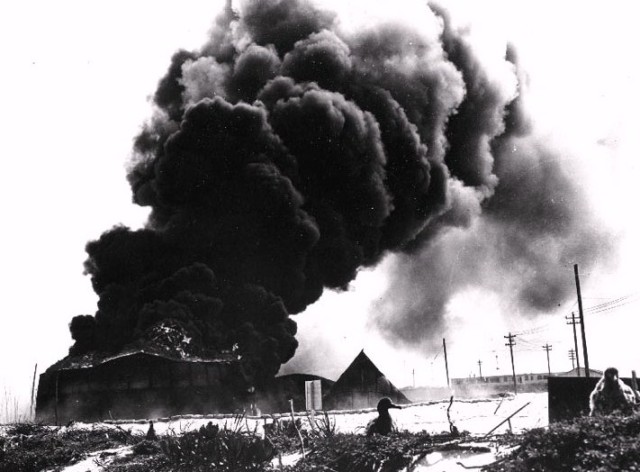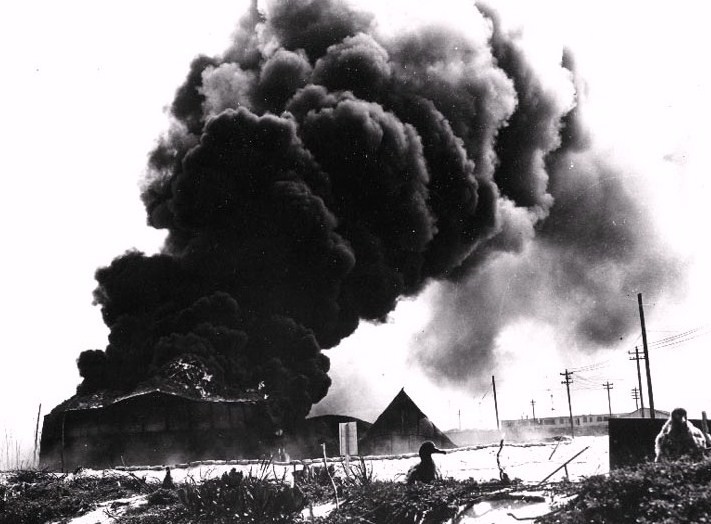As members of the military, lessons learned from past battles will shape how we choose to fight and win future wars. U.S. Army, Pacific leaders are taking advantage of a year-long program designed to study war in the Pacific, with the added benefit of visiting former battlefields and talking to veterans who were there.
June 2010 marks the Battle of Midway 68-year anniversary. The fight with Japan is referred to as the most decisive naval victory of World War II, which turned the tide of the war and untimely led to a U.S. military victory.
Lt. Gen. Benjamin R. Mixon, commander, U.S. Army, Pacific, initiated a senior leader's development program to provide officers, NCOs, and civilians an opportunity to get up close and personal with the military history of the Pacific. In this third iteration of USARPAC's SLDP, leaders studied the Battle of Midway with guest Alan S. Lloyd, National Director Emeritus, Honolulu Council of U.S. Navy League who to shared his thoughts on this strategic battle and provide some insights into its lessons learned.
Lloyd was only 12 years old at the time Pearl Harbor was attacked, but like many others who were on Oahu that infamous day, his life was forever changed by the circumstances of the war.
Lloyd, who worked for Maui Electric and the Hawaiian Electric Co. for more than 30 years and retired as an executive engineer, is also a USS Missouri Memorial Association historian and lecturer on the Battle of Midway.
In the briefing to USARPAC leaders, he pointed out that, "Midway was a victory of intelligence and the Japanese were over confident due to six months of successes early in the war." "Midway," he said, "changed the course of World War II."
He said that although U.S forces had inferior torpedoes and aircraft, through sheer will, courage, intelligence, and perhaps some old fashioned good luck, the U.S. military won the Battle of Midway, enabling President Roosevelt to continue to pursue the grand strategy of Europe.
Winning the Battle of Midway allowed the U.S. military to turn its attention back to the European theater and storm the beaches of Normandy.
"Not too many people understand the significance of this battle and how it shaped the outcome of World War II," he said.
The battle of Midway was also somewhat of a precursor to information operations, as David Hilkert, USARPAC command historian pointed out. "Navy Commander Joseph Rochefort devised a plan where he sent out a cleared message stating that troops where short on water at Midway, although they were not," Hilkert explained.
"The Japanese intercepted this message and then sent their own message in code using the same exact code letters that Rochefort thought the Japanese Army were using for Midway. This enabled Rochefort to crack the Japanese code and get a break-out of all the ships that were planning to attack Midway ... ultimately resulting in the U.S. having the upper hand and a win for the U.S. military and a turning point in the Pacific War," he said.
As the primary SLDP planner Hilkert looks forward to additional programs including the study of the China-Burma-India Campaign, and a staff ride to Kwajalein Atoll and Roi-Namur battlefields. Also a closing ceremony and reception are scheduled for December aboard the USS Missouri.
"The Battle of Midway was the turning point of the war," said Hilkert. "Not only did we win the battle, but I think in the eyes of the American people, sinking four of the six aircraft carriers that launched the attack on our fleet in Pearl Harbor boosted American morale and ultimately led to our winning the war in the Pacific."
Hilkert says that as a baby boomer it's very exciting for him to study military history, because he grew up listening to stories from veterans who served in the war.
"I think there is a lot to be learned from military history and there are a lot of lessons to be learned that can be applied today," said Hilkert. "I'm hopeful that all our leaders will better understand the lessons learned and realize they are important still today, and also understand the role our command had in the war."


Social Sharing